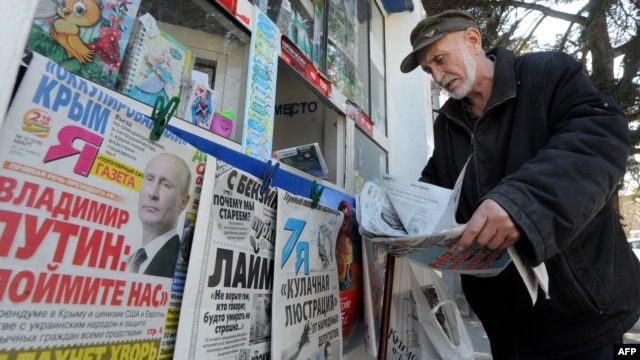Freedom House warns press freedom 'lowest in a decade'
| Publisher | Radio Free Europe/Radio Liberty |
| Publication Date | 1 May 2014 |
| Cite as | Radio Free Europe/Radio Liberty, Freedom House warns press freedom 'lowest in a decade', 1 May 2014, available at: https://www.refworld.org/docid/53a1384f7.html [accessed 3 June 2023] |
| Disclaimer | This is not a UNHCR publication. UNHCR is not responsible for, nor does it necessarily endorse, its content. Any views expressed are solely those of the author or publisher and do not necessarily reflect those of UNHCR, the United Nations or its Member States. |
May 01, 2014
By RFE/RL
 A man looks through a newspaper at a kiosk with Russian newspapers displayed outside in the Crimean port of Sevastopol on March 27.
A man looks through a newspaper at a kiosk with Russian newspapers displayed outside in the Crimean port of Sevastopol on March 27.
Freedom House's latest report on media freedom asserts that Eurasian countries continue to have the world's poorest ratings, with no country in the region rated as "free."
The U.S.-based democracy watchdog released its annual report, "Freedom of the Press 2014: Media Freedom Hits Decade Low," on May 1, assessing the situation in 197 countries and territories during 2013.
According to the report, conditions in Russia remained grim, as the RIA Novosti news agency was closed and the government enacted additional legal restrictions on online speech.
The report says Russia maintained a tight grip on local media while also attempting to control more independent views published either in the blogosphere or by foreign news sources.
"Most of the broadcast media is under state control and then also most of the private print media as well," the report's project director, Karin Karlekar, said. "So the Internet is really one of the only spaces in Russia for free expression, and we did see attempts to sort of extent controls over online content last year by passing a law which would help to enable them to prosecute online content."
Ukraine was downgraded to the "not free" category for 2013 due primarily to attacks on journalists covering the Euromaidan protests.
Karlekar said there was a "sharp rise in physical violence and attacks against journalists as they were trying to cover major political events in Ukraine."
"What we saw at the end of 2013 was, as the protest movements and the Euromaidan movement started up, we saw many instances of journalists being attacked and targeted who were trying to cover those protests," Karlekar told RFE/RL.
Nowhere To Go But Up?
Belarus, Turkmenistan, Uzbekistan, and Iran remained among the world's eight worst-rated countries on press freedom.
"In [all of these] countries the media environment is incredibly restricted," Karlekar said. "There are basically no private media outlets. There is very little influence from online media. It's a very closed environment even for the Internet. And there is state repression and crackdown against any sort of independent voices."
Karlekar said the media environment in the rest of Central Asia also remained "very, very bleak."
But the report praised as a "relative bright spot" some positive developments in Kyrgyzstan – despite its rating as "not free."
Karlekar said there was a "decline in physical attacks and a decline in the use of restrictive laws against the press" in Kyrgyzstan during 2013.
The report says Azerbaijan's already repressive media environment worsened due to increased government surveillance of journalists' and bloggers' online and telephone correspondence.
It also noted other measures to restrict Internet freedom in Azerbaijan.
Freedom House noted positive trends in neighboring Georgia due to legislation that made permanent the country's "must carry, must offer" regulations – which require cable operators to carry all television stations.
Georgia and Moldova were the only two Eurasian countries where the media environment was rated as "partly free" by Freedom House.
Europe On Top
According to the report, Europe boasts the highest level of press freedom worldwide.
However, the report noted some setbacks in a number of European countries.
In Montenegro, for instance, the situation worsened as a result of hostile official rhetoric against the press and impunity for attacks, which included bombs targeting journalists and news outlets.
In conflict-hit Afghanistan and Iraq, it said major challenges continue to be a lack of security and physical threats against journalists.
It cited numerous murders of journalists in both countries during 2013.
Link to original story on RFE/RL website
